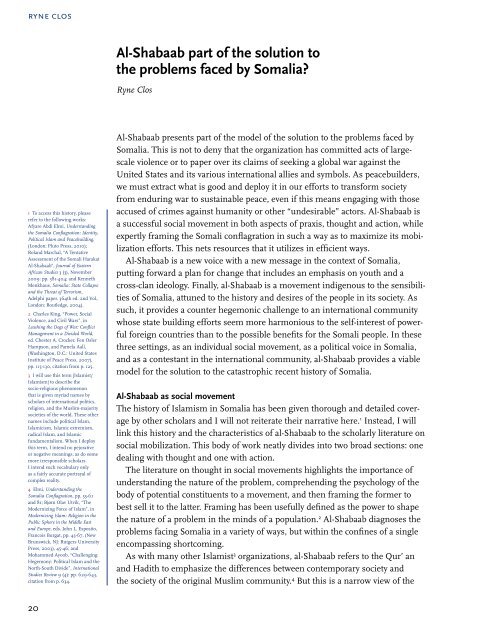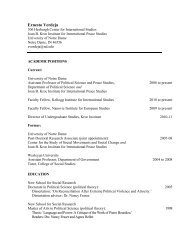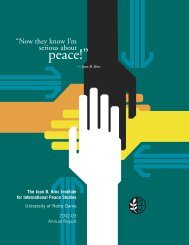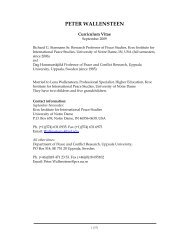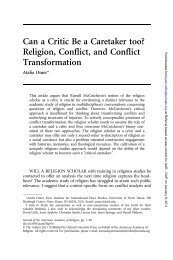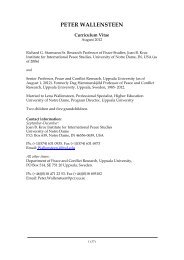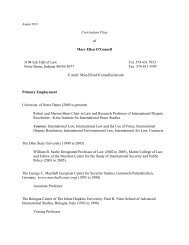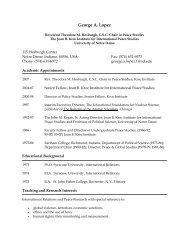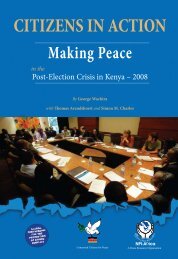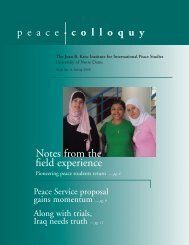Somalia: Creating Space for Fresh Approaches to Peacebuilding
Somalia: Creating Space for Fresh Approaches to Peacebuilding
Somalia: Creating Space for Fresh Approaches to Peacebuilding
Create successful ePaper yourself
Turn your PDF publications into a flip-book with our unique Google optimized e-Paper software.
yne clos<br />
1 To access this his<strong>to</strong>ry, please<br />
refer <strong>to</strong> the following works:<br />
Afyare Abdi Elmi, Understanding<br />
the <strong>Somalia</strong> Conflagration: Identity,<br />
Political Islam and <strong>Peacebuilding</strong>,<br />
(London: Plu<strong>to</strong> Press, 2010);<br />
Roland Marchal, “A Tentative<br />
Assessment of the Somali Harakat<br />
Al-Shabaab”, Journal of Eastern<br />
African Studies 3 (3), November<br />
2009: pp. 381-404; and Kenneth<br />
Menkhaus, <strong>Somalia</strong>: State Collapse<br />
and the Threat of Terrorism,<br />
Adelphi paper. 364th ed. 2nd Vol.,<br />
London: Routledge, 2004).<br />
2 Charles King, “Power, Social<br />
Violence, and Civil Wars”, in<br />
Leashing the Dogs of War: Conflict<br />
Management in a Divided World,<br />
ed. Chester A. Crocker, Fen Osler<br />
Hampson, and Pamela Aall,<br />
(Washing<strong>to</strong>n, D.C.: United States<br />
Institute of Peace Press, 2007),<br />
pp. 115-130, citation from p. 125.<br />
3 I will use this term [Islamist/<br />
Islamism] <strong>to</strong> describe the<br />
socio-religious phenomenon<br />
that is given myriad names by<br />
scholars of international politics,<br />
religion, and the Muslim-majority<br />
societies of the world. These other<br />
names include political Islam,<br />
Islamicism, Islamic extremism,<br />
radical Islam, and Islamic<br />
fundamentalism. When I deploy<br />
this term, I intend no pejorative<br />
or negative meanings, as do some<br />
more irresponsible scholars.<br />
I intend such vocabulary only<br />
as a fairly accurate portrayal of<br />
complex reality.<br />
4 Elmi, Understanding the<br />
<strong>Somalia</strong> Conflagration, pp. 55-61<br />
and 81; Bjørn Olav Utvik, “The<br />
Modernizing Force of Islam”, in<br />
Modernizing Islam: Religion in the<br />
Public Sphere in the Middle East<br />
and Europe, eds. John L. Esposi<strong>to</strong>,<br />
Francois Burgat, pp. 43-67, (New<br />
Brunswick, NJ: Rutgers University<br />
Press, 2003), 45-46; and<br />
Mohammed Ayoob, “Challenging<br />
Hegemony: Political Islam and the<br />
North-South Divide”, International<br />
Studies Review 9 (4): pp. 629-643,<br />
citation from p. 634.<br />
20<br />
Al-Shabaab part of the solution <strong>to</strong><br />
the problems faced by <strong>Somalia</strong>?<br />
Ryne Clos<br />
Al-Shabaab presents part of the model of the solution <strong>to</strong> the problems faced by<br />
<strong>Somalia</strong>. This is not <strong>to</strong> deny that the organization has committed acts of largescale<br />
violence or <strong>to</strong> paper over its claims of seeking a global war against the<br />
United States and its various international allies and symbols. As peacebuilders,<br />
we must extract what is good and deploy it in our ef<strong>for</strong>ts <strong>to</strong> trans<strong>for</strong>m society<br />
from enduring war <strong>to</strong> sustainable peace, even if this means engaging with those<br />
accused of crimes against humanity or other “undesirable” ac<strong>to</strong>rs. Al-Shabaab is<br />
a successful social movement in both aspects of praxis, thought and action, while<br />
expertly framing the Somali conflagration in such a way as <strong>to</strong> maximize its mobilization<br />
ef<strong>for</strong>ts. This nets resources that it utilizes in efficient ways.<br />
Al-Shabaab is a new voice with a new message in the context of <strong>Somalia</strong>,<br />
putting <strong>for</strong>ward a plan <strong>for</strong> change that includes an emphasis on youth and a<br />
cross-clan ideology. Finally, al-Shabaab is a movement indigenous <strong>to</strong> the sensibilities<br />
of <strong>Somalia</strong>, attuned <strong>to</strong> the his<strong>to</strong>ry and desires of the people in its society. As<br />
such, it provides a counter hegemonic challenge <strong>to</strong> an international community<br />
whose state building ef<strong>for</strong>ts seem more harmonious <strong>to</strong> the self-interest of powerful<br />
<strong>for</strong>eign countries than <strong>to</strong> the possible benefits <strong>for</strong> the Somali people. In these<br />
three settings, as an individual social movement, as a political voice in <strong>Somalia</strong>,<br />
and as a contestant in the international community, al-Shabaab provides a viable<br />
model <strong>for</strong> the solution <strong>to</strong> the catastrophic recent his<strong>to</strong>ry of <strong>Somalia</strong>.<br />
Al-Shabaab as social movement<br />
The his<strong>to</strong>ry of Islamism in <strong>Somalia</strong> has been given thorough and detailed coverage<br />
by other scholars and I will not reiterate their narrative here. 1 Instead, I will<br />
link this his<strong>to</strong>ry and the characteristics of al-Shabaab <strong>to</strong> the scholarly literature on<br />
social mobilization. This body of work neatly divides in<strong>to</strong> two broad sections: one<br />
dealing with thought and one with action.<br />
The literature on thought in social movements highlights the importance of<br />
understanding the nature of the problem, comprehending the psychology of the<br />
body of potential constituents <strong>to</strong> a movement, and then framing the <strong>for</strong>mer <strong>to</strong><br />
best sell it <strong>to</strong> the latter. Framing has been usefully defined as the power <strong>to</strong> shape<br />
the nature of a problem in the minds of a population. 2 Al-Shabaab diagnoses the<br />
problems facing <strong>Somalia</strong> in a variety of ways, but within the confines of a single<br />
encompassing shortcoming.<br />
As with many other Islamist 3 organizations, al-Shabaab refers <strong>to</strong> the Qur’ an<br />
and Hadith <strong>to</strong> emphasize the differences between contemporary society and<br />
the society of the original Muslim community. 4 But this is a narrow view of the


